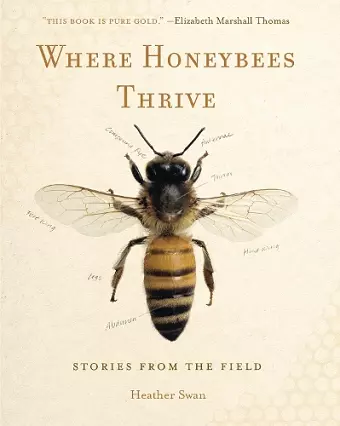Where Honeybees Thrive
Stories from the Field
Format:Paperback
Publisher:Pennsylvania State University Press
Published:31st Oct '17
Should be back in stock very soon

Colony Collapse Disorder, ubiquitous pesticide use, industrial agriculture, habitat reduction—these are just a few of the issues causing unprecedented trauma in honeybee populations worldwide. In this artfully illustrated book, Heather Swan embarks on a narrative voyage to discover solutions to—and understand the sources of—the plight of honeybees.
Through a lyrical combination of creative nonfiction and visual imagery, Where Honeybees Thrive tells the stories of the beekeepers, farmers, artists, entomologists, ecologists, and other advocates working to stem the damage and reverse course for this critical pollinator. Using her own quest for understanding as a starting point, Swan highlights the innovative projects and strategies these groups employ. Her mosaic approach to engaging with the environment not only reveals the incredibly complex political ecology in which bees live—which includes human and nonhuman actors alike—but also suggests ways of comprehending and tackling a host of other conflicts between postindustrial society and the natural world. Each chapter closes with an illustrative full-color gallery of bee-related artwork.
A luminous journey from the worlds of honey producers, urban farmers, and mead makers of the United States to those of beekeepers of Sichuan, China, and researchers in southern Africa, Where Honeybees Thrive traces the global web of efforts to secure a sustainable future for honeybees—and ourselves.
“This book is pure gold. To understand the life around us is perhaps the most important thing we can do for our planet, and Where Honeybees Thrive is a huge step forward. We are too inclined to think that the tiny animals don’t matter, or that they’re dispensable because there seems to be so many of them. If you know people with that opinion, please give them this book because it can change their minds.”
—Elizabeth Marshall Thomas, author of The Hidden Life of Dogs
“Where Honeybees Thrive isn’t a book for people only interested in the practice of beekeeping, nor for left-brain theorists or right-brain dreamers. It is for readers who find themselves adrift in the middle space, never entirely here nor there, searching for tranquility amid the hum.”
—Joe Phillips Minding Nature
“A beautifully written and original approach to the crucially important and still underappreciated problem of bee decline in the modern world. With a lyrical, searching style that recalls the best of Annie Dillard, Swan argues eloquently and persuasively both for the urgent need to intervene in this global crisis and for the myriad ways in which mindfulness about bees can help human beings understand themselves more deeply.”
—Eric C. Brown, editor of Insect Poetics
“Anyone who likes honeybees, or is even afraid of honeybees, will find this book fascinating and infectious. The author carries us on a glorious journey into the lives of honeybees and the people who keep and cherish them. The story is woven with passion and a lively blend of prose, poetry, art, and philosophy—it is part love song, part lament, part quest, and entirely engaging. Just as Rachel Carson dramatized the plight of our environment in the face of modern chemicals, Heather Swan portrays the plight of bees in light of modern agricultural practices and insecticides. Where Honeybees Thrive is a must-read for lovers of nature, bees, and books.”
—Justin O. Schmidt, author of The Sting of the Wild
“A very special and encouraging book—a great gift for anyone with concern for bees.”
—Bees for Development Journal
“I suggest you kick back with a glass of mead as you savor the storytelling of master beekeeper and bee lover Heather Swan. This is a unique and worthwhile book, a new twist on honey bees that you are not likely to find anywhere else.”
—Stephen Buchmann The Quarterly Review of Biology
- Nominated for Wisconsin Writers Awards 2018
- Nominated for Sigurd Olson Nature Writing Award 2017
ISBN: 9780271077413
Dimensions: 216mm x 171mm x 12mm
Weight: 340g
176 pages